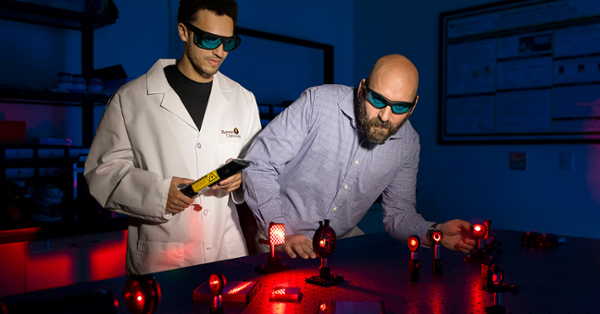Princeton, Rowan, Rutgers and Nokia Bell Labs-led photonics team named among top 15 finalists in National Science Foundation competition
Princeton, Rowan, Rutgers and Nokia Bell Labs-led photonics team named among top 15 finalists in National Science Foundation competition

Advancing Photonics Technologies (APT), a coalition led by Princeton’s Office of Innovation to advance the photonics and optics industry in New Jersey, Pennsylvania, and Delaware, has been named a finalist in the National Science Foundation’s Regional Innovation Engines program. The NSF Engines program seeks to catalyze and foster innovation ecosystems across the United States. 
APT, the leadership team of which includes Rowan University, Rutgers University and Nokia Bell Labs, is one of 15 finalists, selected from nearly 300 letters of intent in response to the NSF Engines’ call for proposals.
“The power of our proposal lies in our collaboration,” said Rowan University Provost Vojislava “Voki” Pophristic. “Bringing together these partners has already resulted in a vibrant framework for developing new technologies, companies and jobs for our region. We look forward to taking the next step.”
Numerous universities, community colleges, industry, government agencies, technology accelerators and other entities are part of APT. They will collectively develop, invest in and commercialize photonics and optics technologies. A list of partners is on the APT website.
Photonics is the generation, detection, and manipulation of light. It powers countless advancements in national security, job growth, and technological competitiveness, and is vital to aerospace, cybersecurity, communications, information processing, life sciences, military sensors and navigation, and quantum computing.
Because of the strong optics and photonics manufacturing and research capacity, and the convergence of partners driving photonics innovations in the tri-state area, APT leaders are calling their region “Photon Junction.” APT’s technological focus areas are energy-efficient, optically integrated hardware for information processing, optical sensors, and advanced materials and optical components, which are the foundation for the photonics market.
“The photonics market is growing and enables a breadth of jobs in numerous industries,” said Theodore “Tod” Sizer, the head of optical systems and device research at Nokia Bell Labs and a co-principal investigator for APT. “Given the large number of photonics companies in Photon Junction, including Nokia Bell Labs, the opportunity for collaboration to advance our strategic goals is significant. By connecting industry, academia, startups, government, and venture capital in Photon Junction and beyond, APT will strengthen technological capacity and workforce development to meet industry and regional economic needs,” Sizer said.
APT will also play an important role in creating and commercializing photonics innovations, supporting early-stage startups through fueling a robust entrepreneurial community. As a result of its NSF Development Award in 2023, APT has started to see initial successes in powering Photon Junction’s newest founders.
“VectorScribe would not be an early-stage startup without APT,” said David McGee, a professor of physics at The College of New Jersey and founder of VectorScribe LLC. “For smaller, academic-based startups like us, there is a critical need for an entrepreneurial community focused on photonics that can connect innovative research with the manufacturing, end-user and investment ecosystem.”
As APT advances to the next stage in the Engines competition, the team is grateful for its many partners, noting that one of the Development Award successes is bringing together organizations from across the region.
“APT’s drive to leverage the rich spectrum of photonics innovators in this region goes far beyond startups. With the partnership of the NSF in Photon Junction’s critical next years, APT will be able to accelerate these startups into employers that will drive economic growth,” McGee said.
Princeton hosted APT’s first annual SPOTLIGHT Photonics Innovation Ecosystem Summit on campus in May. Sponsored by Teledyne, Go!Foton, Hamamatsu, Coherent, Delaware Prosperity Partnership, Ben Franklin Technology Partners of Northeastern Pennsylvania and Thorlabs, SPOTLIGHT illuminated the present—and the potential—for the region.
“We are inspired by our partners’ enthusiastic support and energized by this exciting news,” said Christine Galib, director of APT’s Development Award. “Thank you to each of our partners for your desire to build with us as well as to the NSF for selecting us to advance and believing in our vision for Photon Junction’s bright future. As we prepare for the in-person site visit, we look forward to showing how APT, our partners and Photon Junction shine.”
NSF Engines semi-finalists were announced in July. The finalists were chosen after a round of live, virtual assessments. NSF anticipates announcing its selections for Engine awards in early 2026.